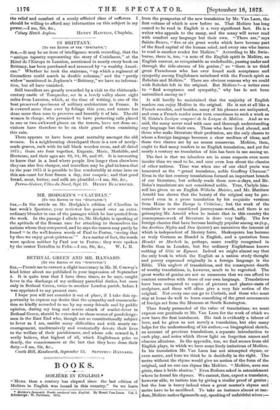IN BRITTANY.
[TO THE Emelt OF THE " $PECTATOR:1 Sin,—It may be an item of intelligence worth recording, that the "antique tapestry representing the story of Coriolanus," at the Hotel de l'Europe in Lannion, mentioned in nearly every book on Brittany, has been purchased and removed by "a wealthy Ameri- can." Whether he took the staircase, "up which a regiment of Grenadiers could march in double columns," and the "portly widow"mentioned in Jephson's "Brittany," we have no informa- tion, but all have vanished.
Still travellers are greatly rewarded by a visit to the thirteenth- century castle of Tonquedec, set in a lovely valley about eight miles from Lannion, which, at the time of writing, is one of the best preserved specimens of military architecture in France. It is covered more than ever by foliage this year, and nature has done more than man to preserve and beautify it of late. The old women in charge, who promised to have protecting rails placed in one or two awkward places on the towers, have not done so ; visitors have therefore to be on their guard when examining this ruin.
There appears to have been great mortality amongst the old women. In a neighbouring churchyard there is a row of newly- made graves, each with its tall black wooden cross, and all dated 1875; there are four together, Eugenie, Marie, Mathilde, and Hortense, and their ages are 82, 84, 88, and 89. It is interesting to know that in a land where people live longer than elsewhere they can also live cheaper, and travellers may be glad to learn that in the year 1875 it is possible to live comfortably at some inns on this sea-coast for four francs a day, tout compris ; and that good bread, meat, butter, and milk are plentiful.—I am, Sir, &c., Perros-G uirec, Cotes du Nord, Sept. 13. HENRY BLACKBURN.






























 Previous page
Previous page